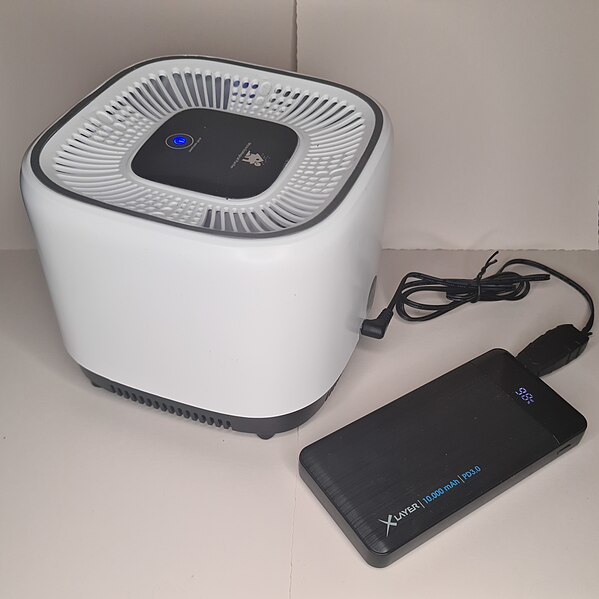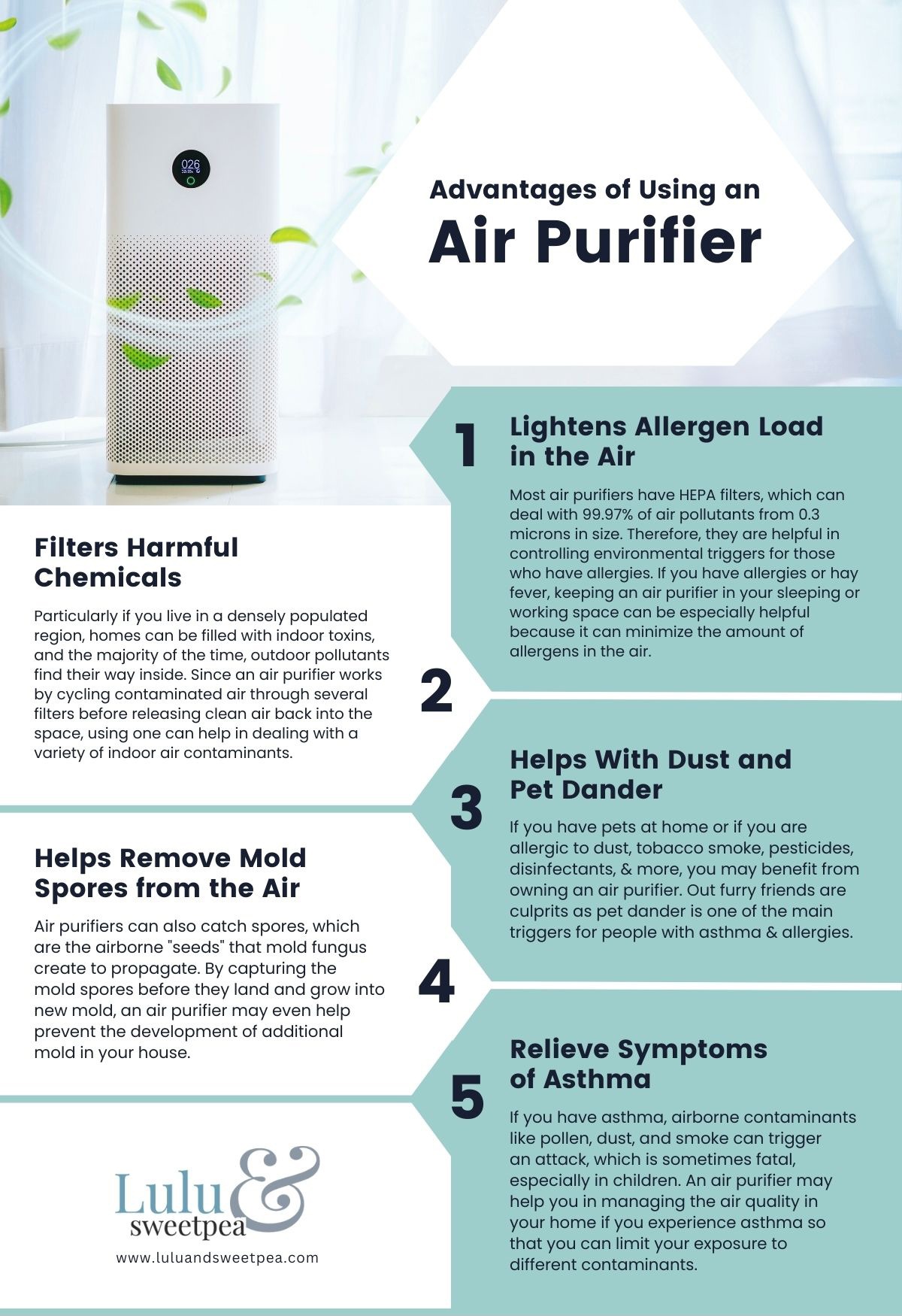Looking for a way to ensure that the air in your garage is clean and healthy? An air purifier is the answer! This highly effective device is designed to remove harmful particles and allergens from the air. Air purifiers can help reduce the risk of health problems associated with exposure to pollutants and provide a safer and healthier environment. In this article, we will talk about how to choose an air purifier for your garage.
Common Garage Pollutants
These are the commonly found harmful pollutants in garages that can pose a risk to your health:
Cars Exhaust
When vehicles come and go, they release exhaust fumes that can accumulate in the enclosed space. This exhaust contains dangerous substances, including carbon monoxide.
Chemicals
Chemical products like fertilizers, pesticides, solvents, and gasoline can release harmful gasses if not sealed properly. These gasses can heap up in the garage or even spread into living areas.
Dust
Poorly maintained garages are more likely to accumulate dust from various causes, including tyre and road dust and other environmental factors.
Mold Spores
Mold spores are a common and potentially harmful pollutant found in garages, particularly in areas with high humidity or dampness. Garages that lack proper ventilation or have water leaks are particularly susceptible to mold growth.
These Pollutants Can Affect Indoor Air Quality
Pollutants found in indoor spaces, like garages, can make the air harder to breathe and cause discomfort. When we breathe in too much of these pollutants, they can irritate our nose and throat. Some pollutants, like dust and mold, can even stick to surfaces and create an unhygienic environment. The end result is that we end up with air that isn’t as clean or comfortable to breathe.
Pollutants Can Affect Your Health and Well-being
When you spend time in a garage with poor ventilation, you may be exposed to various pollutants that can negatively impact your health. For example, car exhaust contains harmful chemicals like carbon monoxide that can cause dizziness, nausea, and in severe cases it may cause fainting.
Breathing in mold spores can lead to respiratory issues and allergies. Exposure to chemicals from cleaning products and other substances commonly found in garages can also cause irritation to your eyes, nose, and throat. Finally, dust and other particulate matter can exacerbate respiratory problems and cause discomfort.
The Benefits of Air Purifiers in Garages
Installing an air purifier in garages can offer several advantages, and we have compiled a list of some of the common benefits for your consideration.
Improving Garage Air Quality with Air Purifiers
Air purifiers can greatly improve indoor air quality in garages by filtering out harmful particles.
By cycling air through multiple filters, air purifiers can trap even microscopic particles and release clean air back into the garage.
Potential Health Benefits Of Air Purifiers In Garage
Using air purifiers in garages can provide numerous health benefits, particularly for those with allergies or respiratory problems. By reducing the allergen load in the air, air purifiers can significantly decrease symptoms of hay fever and other allergies. In addition, air purifiers can help prevent the transmission of pathogens and reduce the risk of infectious diseases.
Air Purifiers Can Reduce Garage Pollutants
Air purifiers can effectively eliminate common garage pollutants such as dust, and car exhaust. They can help lower the levels of chemicals and other contaminants released by appliances or chemical cleaners in the garage.
Types of Air Purifiers for Garages
There is a wide variety of air purifiers available on the market, and choosing the right one for your garage can be overwhelming. To help simplify your decision-making process, understand the differences between the four main types of air purifiers available:
HEPA Air Purifier
HEPA (High-Efficiency Particulate Air) filtration is a widely used technology in air purifiers that is known for its ability to remove almost any airborne particles that are 0.3 microns or larger in size, including dust, mold spores, and dust mites. This type of air filter can also capture most bacteria.
Pros:
- HEPA filters remove dust, pollen, mold spores, dust mites, and other allergens.
- It can remove most bacteria.
- Solid particles captured are not released into the air again.
Cons:
- HEPA filters are not so good at removing chemical fumes and odors.
- Its filters are not as effective in capturing the smallest viruses.
Activated Carbon Air Purifier
Carbon purifiers, also known as activated carbon air filters, are air purification systems that use activated carbon filters to absorb and trap pollutants as they pass through the filter. The activated carbon has small pores that chemically react with the pollutants, causing them to bond with the carbon and become trapped.
Pros:
- Highly effective at removing smoke, odors, and chemicals from the air
- Can remove certain gasses from the air
- Does not release pollutants back into the air
- Quiet operation
Cons:
- Less effective at removing dust, allergens, and micro-organisms from the air
- Require frequent filter changes
- Higher initial cost compared to other types of air purifiers
- May produce noise at higher fan speeds
Ionic Purifier
The Ionic Purifier is a type of air purifier that uses ionization technology to clean the air. This technology works by charging air molecules, creating positive and negative ions. These charged ions then attach to airborne particles, such as dust, pollen, and smoke, causing them to clump together and fall out of air, making them easier to filter out. The Ionic Purifier is often used in conjunction with a filter to capture these clumped particles.
Pros
- Effective at removing allergens such as dust, pollen, and smoke
- Ionization technology does not produce harmful ozone emissions
- Quieter than other types of air purifiers
- Does not require frequent filter replacements
Cons
- Does not capture larger particles
- Clumped particles may settle on surfaces in the room, requiring additional cleaning
- May produce a faint odor from the charged ions
UV Air Purifier
The UV air purifier uses ultraviolet light with electromagnetic radiation to eradicate bacteria and other pathogens by breaking the molecular bonds in their DNA, killing these particles without actual filtration. While a UV light air purifier is efficient at killing bacteria, viruses, molds, and yeasts in the air, it is not so good at eliminating dust, allergens, or solid particles.
Pros
- Destroys microorganisms, such as germs, bacteria and mold
- Helps prevent illness and disease
Cons
- Does not work well in removing most allergens, dust, or solid particles in the air
- Not so good at removing chemical fumes, gasses, or cigarette smoke
Tips For Choosing The Right Air Purifier For The Garage
When choosing an air purifier, it’s important to consider the type of air purifier, coverage area, airflow rate, filtration efficiency, maintenance requirements, noise level, and budget. These factors can help you choose an air purifier that meets your needs and is suitable for the environment in which it will be used. By considering these factors, you can ensure that the air purifier is effective in removing pollutants and maintaining good air quality.
Considerations For Air Purifiers In Garages
Noise level And Placement Of Air Purifiers
If you want an air purifier to clean the air in your garage, it’s vital to put it in the right spot. You should place it in the middle of the garage where air can flow freely around it. Also, pick an air purifier that isn’t too loud, especially if you plan to spend a lot of time in the garage.
Maintenance And Filter Replacement Costs
When considering the cost of an air purifier, it’s wise to not only look at the initial price but also factor in ongoing maintenance and filter replacement costs. The cost of filters can vary widely, from $20 to over $200 depending on the brand and type of filter.
In addition to filter replacement costs, some air purifiers require regular care to ensure they operate at peak performance, which can add to the overall cost of ownership. Before purchasing an air purifier, it’s important to research and compare maintenance requirements and associated costs to ensure you make an informed decision that fits your budget and needs.
Energy Efficiency Of Air Purifiers
When looking for an air purifier, choose one that uses less energy to help save money on electricity bills. Look for ones that have a special sticker called “Energy Star” or have a low number for “wattage”. Make sure the air purifier can clean the air in your garage by checking how much air it can clean and how big of an area it can cover.
Conclusion
Putting an air purifier in your garage has a lot of advantages, including improving the air you breathe and lowering the risk of health problems from pollutants. However, it’s important to think about your own needs and situation before deciding if an air purifier is right for your garage. It’s important to take steps to make the air in your garage safer and healthier.


